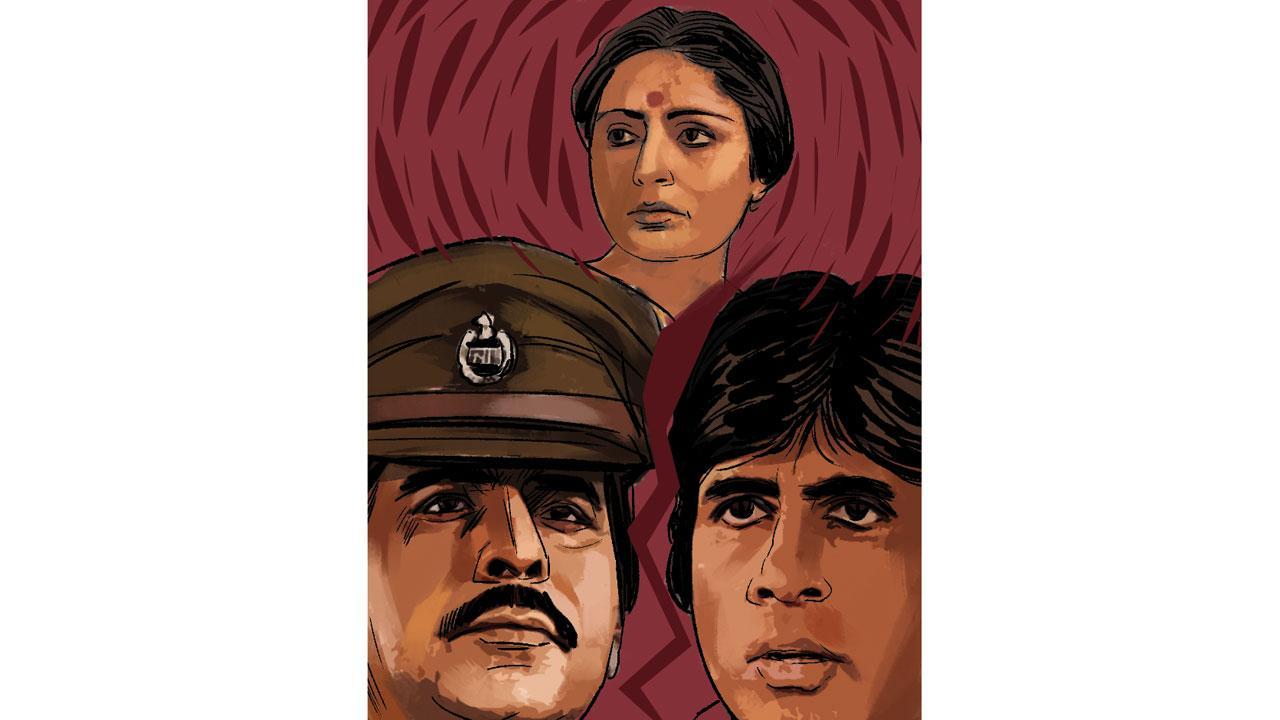The film is also about the high price of machismo, that prevents men from expressing love

Illustration/Uday Mohite
![]() Last week brought another opportunity to wallow in nostalgia, as I watched Ramesh Sippy’s magnificent Shakti (Power) of 1982, from 40 years ago, spellbound. Starring powerhouse performances by Dilip Kumar and Amitabh Bachchan, who are trapped in an elemental dilemma between love and duty. Not only does Shakti remain one of the enduring films of Bollywood, but it effortlessly surpasses most of the Hindi films that I’ve seen in 2022, revealing how much the film industry has “progressed”.
Last week brought another opportunity to wallow in nostalgia, as I watched Ramesh Sippy’s magnificent Shakti (Power) of 1982, from 40 years ago, spellbound. Starring powerhouse performances by Dilip Kumar and Amitabh Bachchan, who are trapped in an elemental dilemma between love and duty. Not only does Shakti remain one of the enduring films of Bollywood, but it effortlessly surpasses most of the Hindi films that I’ve seen in 2022, revealing how much the film industry has “progressed”.
ADVERTISEMENT
The screening was part of Film Heritage Foundation’s two landmark, very popular film festivals of Amitabh Bachchan and Dilip Kumar, in theatres nationwide. Bachchan: Back To The Beginning ran in October, while the Dilip Kumar: Hero Of Heroes festival ran on December 10-11, with Aan (1952), Devdas (1955), Ram Aur Shyam (1967) and Shakti (1982). Held in collaboration with PVR and Inox, Dilip Saab’s films screened at 30 all-India cinemas. Along with the older generation, it was wonderful to see a large number of youngsters in the audience, always a very healthy sign.
At its heart, Shakti is about the struggle between love and duty, an epic dilemma as old as the Mahabharat. Dilip Kumar plays upright police officer Ashwini Kumar: when the smugglers kidnap his son Vijay (Amitabh Bachchan) for ransom, he refuses to play their game. Spoiler alert: Vijay grows up hating his dad, leaves home to live and work with the smugglers, and finally, Ashwini shoots Vijay dead in a dramatic climax on the airport runway. Moments before, when Ashwini finally tells Vijay he loves him very much, Vijay asks, in the throes of death, “Toh kaha kyun nahin, Dad?”(“Why didn’t you say so before, Dad?”). The film is also about the high price of machismo, that prevents men from expressing love.
Ramesh Sippy’s oeuvre is not vast, but his early work has many milestones, including Andaz, Seeta aur Geeta, Sholay (1975), Shakti (1982) and Buniyaad (the TV series, 1987). Shakti has a lot in common with Yash Chopra’s earlier Deewaar of 1975, which centered around a similar kidnap of the kids of an upright man, the subsequent conflict of love versus duty, with a mother whose two sons grow up to be a smuggler and a cop, and she hands the cop-son his gun to shoot the smuggler-son dead. Beyond this moral dilemma, it emphasised a sentimental mother-son relationship, with heavy-duty dialoguebaazi about maa ka farz (mother’s duty) and the eternal “Mere paas Maa hai”. Earlier, Mehboob Khan’s Mother India (1957) also had the mother shooting her bad son dead herself. And, of course, the epic Mahabharata is about two sets of warring cousins: when Arjuna hesitates to kill his cousins in battle, Lord Krishna, his guide, tells him he must do his duty, regardless of the consequences.
The glorious Shakti includes many stellar minority talents—as well as those who originally came from across the border—including Ramesh Sippy, Dilip Kumar, writers Salim Khan and Javed Akhtar, and producers Mushir-Riaz. The DNA of Bollywood is fundamentally secular, inclusive and has erased borders since a century. However much the regime tries to harass minority talent in Bollywood, India has dil de chuke sanam to talent, regardless of religion and origins. Right Wingers can only be jealous boyfriends who, unable to get the girl, can only scratch out double hearts graffiti on the walls in frustration.
The film got a long, long ovation.
Sippy introduced the film, saying how “Dilip Kumar was never satisfied. And for his first take, he asked for 62 retakes. That was his passion, even at that age.” And it was lovely to see the ’80s mood, featuring Arabs in Bombay, villains in the most smartly tailored suits, and bead curtains decorating homes. Bonus delight: when there was a reference to smugglers landing at Versova, the entire audience in PVR roared with laughter, as that is the address of most of the film industry today. True, today’s Bollywood can hardly match up to Shakti. Yet, may the Force be with you.
Meenakshi Shedde is India and South Asia Delegate to the Berlin International Film Festival, National Award-winning critic, curator to festivals worldwide and journalist.
Reach her at meenakshi.shedde@mid-day.com
 Subscribe today by clicking the link and stay updated with the latest news!" Click here!
Subscribe today by clicking the link and stay updated with the latest news!" Click here!







